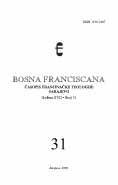Grijeh i zločin u europskim književnostima XIX. stoljeća
Sin and Crime in European Literature of the XIXth Century
Author(s): Ivan PederinSubject(s): Literary Texts
Published by: Franjevačka teologija Sarajevo
Summary/Abstract: In XIXth Century literature sees crime a problem, that is the difference to elder periods. This century is the century of reorganization and updating of the state administration and passing of modern law. Authors look for the difference between sin and crime. Now we fi nd penitent sinners and criminals two commit to the Lord as Hugo’s Jean Valjean did, ruthless and immoral men as Stendhal s Julien Sorel was, a man who despises mankind and morality in order to achieve elevated offi ces. The state is seen as an alienated power that squeezes man and its dignity, a blind and unjust power. Decent and well intentioned people are herded in penitentiaries. The criticism of the state authority is ruthless and leads towards the revolutions of the XX. Being a uprising against this oppressive state. In these novels we frequently fi nd a policeman as a representative of the state, a sadist. The authority is sinful and perverted. Only in English literature the presence of the state is discreet, but Dickens and Stendhal are markedly non-ecclesiastic. Stendhal is anticlerical and an enemy of the Jesuites. The crime is a mode to acquire wealth and richness. No complete theological analysis. On the other side Dostoevsky creates in Raskolnikov a theological hero and Leo N. Tolstoi criticism of the state leads clearly to expressionism and the October revolution, although his standpoint is Christian.
Journal: Bosna Franciscana
- Issue Year: 2009
- Issue No: 31
- Page Range: 29-59
- Page Count: 31
- Language: Bosnian
- Content File-PDF

